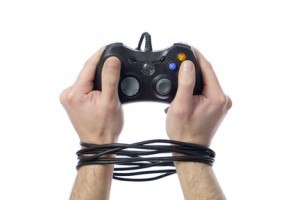Do Your Child a Favor: LOVE Mistakes
One-hundred-twenty-three children played this video game, all 7-years-old. No, it’s not the start of a bad joke. It’s the start of an interesting study about learning. Anyway, the children played a fast-paced game in which each player helped a zoo-keeper capture escaped animals by pressing the space bar when an animal appeared UNLESS…(there is always an “unless,” an exception) a group of three “orangutan friends” appeared. These  “orangutan friends” were helping capture the other animals. They were “allies,” so the player had to refrain from capturing them. Although the children had fun playing the video game, the real purpose of the game was to test accuracy and impulse control (not pushing the space bar when the three “orangutan friends” appeared). One more thing you need to know—the whole time the 7-year-olds played, researchers monitored their brain activity. In particular, they wanted to know what happened in the brain when a child makes a mistake.
“orangutan friends” were helping capture the other animals. They were “allies,” so the player had to refrain from capturing them. Although the children had fun playing the video game, the real purpose of the game was to test accuracy and impulse control (not pushing the space bar when the three “orangutan friends” appeared). One more thing you need to know—the whole time the 7-year-olds played, researchers monitored their brain activity. In particular, they wanted to know what happened in the brain when a child makes a mistake.
They discovered that some children exhibited a significant increase in brain activity about half-a-second after making a mistake, indicating their awareness of the mistake and their attention to what went wrong. These children exhibited improvement in their performance after making a mistake.
Another group of children did not exhibit this significant change in brain activity when they made a mistake. They seemed to “gloss over” the mistake and mentally avoid acknowledging it. Their performance did not improve. They continued to play and make the same mistakes over again.
Of course, the implication of these results seems obvious: when we pay attention to our mistakes we learn from them and improve our future performance. So why do so many children not pay attention to mistakes? Perhaps they have never learned the importance of acknowledging and learning from mistakes. As a parent, you can help remedy this situation and increase your children’s ability to learn by loving mistakes!
- Love your own mistakes. When you make a mistake, acknowledge it. No need to get defensive or angry. Simply acknowledge the mistake. Attend to that mistake and figure out how you can avoid it in the future. In other words, learn from your mistake. Talk to your children about mistakes you have made, what you learned from those mistakes, and how you corrected it. Modeling this type of response to mistakes will create an environment in which your children are free to do the same.
- Love your children’s mistakes. When you children make a mistake, address it calmly and directly. Don’t belittle them for the mistake, but don’t gloss over it either. Don’t shy away from the mistake with a simply, “It’s OK, you’ll do better next time.” Address the mistake. “You made a mistake. Mistakes happen. Let’s figure out where you went wrong and how we can fix it.” The opportunity to figure the mistake out opens the door for improvement. So explore the mistake. Talk about the mistake and what might fix it. Then enjoy the solution.
When we love our mistakes children will learn to accept mistakes as a learning opportunity. They will delve into challenges with little fear of mistakes or failure because they know mistakes lead to growth. They will pay attention to their mistakes and improve the next time; and, as a result, they will enjoy greater confidence in the present and success in the future.
-0 Comment-